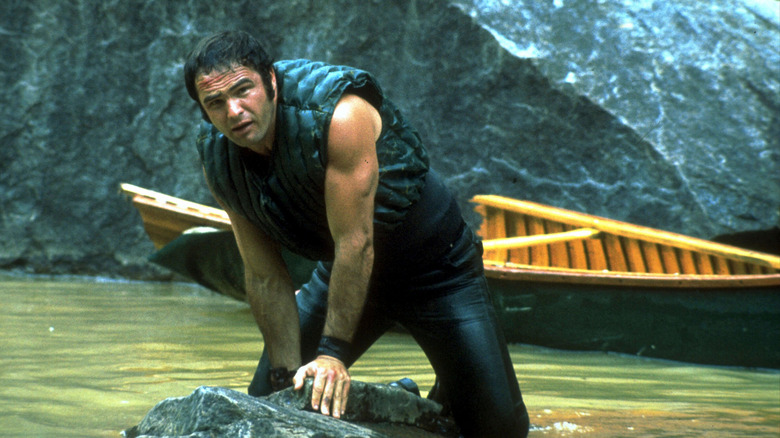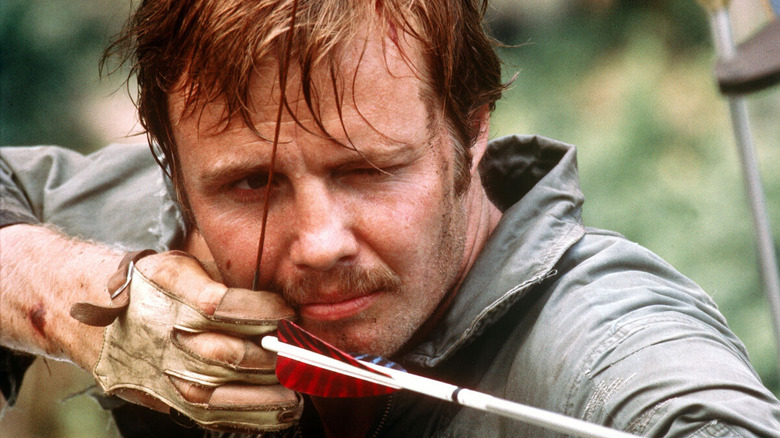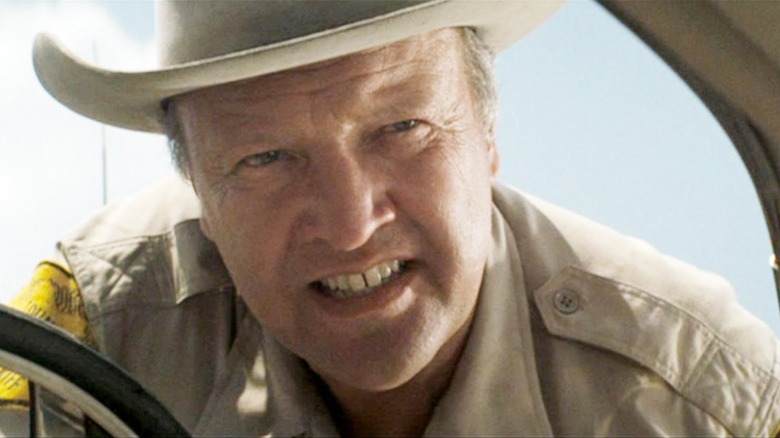This Beloved Burt Reynolds Movie Caused A Huge Fist Fight On Set
British directors in the early 1970s were a controversial bunch. Ken Russell scandalized everyone with "The Devils," and Michael Winner caused a stir by championing vigilantism in "Death Wish." After making the first X-certificate film to win a Best Picture Oscar with "Midnight Cowboy," John Schlesinger caused further pearl-clutching with his frank depiction of homosexuality in "Sunday Bloody Sunday." Then there was John Boorman, a director often described as "idiosyncratic." He gave us Sean Connery in a nappy in "Zardoz" and "Exorcist II: The Heretic," regarded as one of the worst movies ever made. Even his multi-Oscar-nominated "Deliverance" wasn't entirely free from some level of craziness, resulting in rumors of a punch-up between Boorman and his rough-and-tumble screenwriter, James Dickey.
Boorman's beloved backwoods survival thriller was a major box office success and earned the Brit a double Oscar nod for Best Picture and Best Director, making Burt Reynolds a star and solidifying Jon Voight's reputation as a significant Hollywood actor in the process. It was so popular that the film even spawned an unlikely chart hit with "Duelling Banjos," which soared to second position on the U.S. Billboard Hot 100. "Deliverance" also holds the distinction of being the only film to date based on the works of Dickey, the poet laureate whose 1970 debut novel of the same name received critical acclaim and reached the New York Times bestseller list.
Warner Bros. snapped up the film rights, landing Dickey a deal north of $100,000 and the screenwriting gig. This gave Dickey significant clout, and he had a big say in who would direct and star the movie adaptation. Boorman got the job over Dickey's choice, Sam Peckinpah, and he soon found that the imposing writer would give him as many headaches as shooting a movie and directing stunts in the wild natural setting of Georgia.
What happens in Deliverance?
Inspired by James Dickey's experiences during a year-long trip to Italy, "Deliverance" follows four affluent guys on a weekend trip that turns into a brutal nightmare. We have unassuming ad man Ed (John Voight); cocksure insurance salesman Bobby (Ned Beatty); and conscientious company executive Drew (Ronny Cox), who also enjoys a little bluegrass guitar. Leading the pack is self-confident realtor Lewis (Burt Reynolds), a wannabe survivalist who encourages the group to leave the home comforts of Atlanta to canoe along the Cahulawassee River in the wilds of northern Georgia before it is dammed. Stopping off at a rundown gas station, they are rude to the hillbilly locals before enlisting them to drive their vehicles 40 miles downstream to await them at the end of their adventure.
The trip starts out well, with the boys enjoying the thrill of navigating white water and the stunning, unspoilt nature. But things take a ghastly turn when Ed and Bobby run into a pair of mountain men who sexually assault the latter at gunpoint. Ed's next, but Lewis arrives just in time to shoot one assailant through the back with his bow and arrow. The second attacker escapes, and the weekenders must make a terrible moral decision about what to do with the body. Their choice will have potentially serious repercussions once they return to civilization.
"Deliverance" is a beautifully shot film that inspires a sense of awe for the natural landscape while evoking a deep feeling of dread about what dangers lurk in the wilderness, far away from the relative safety of urban life. It is often regarded as the originator of the backwoods horror subgenre, pitting out-of-their-depth city dwellers against scary country folk. It's hard to imagine the likes of "The Texas Chain Saw Massacre" or indeed "Tucker & Dale vs. Evil" without its troubling influence.
Things got ugly between Boorman and Dickey down in Georgia
When John Boorman and his team arrived in Rabun County, Georgia, to film "Deliverance" on location, James Dickey soon started throwing his weight around on set. Cutting an imposing figure, even the strapping Burt Reynolds confessed to feeling physically intimidated by the author, joking that he "did a lot of standing on chairs and things when he came around." Despite Dickey giving the actors pause, the cast also felt great admiration for him, too, and Ronny Cox fondly recalls getting a chance to hear him read his poetry first-hand.
Unfortunately, Dickey was very protective of his work and felt that he was on set to direct the movie as well as work with the screenplay. Seemingly taking a method approach to dealing with the stars, he insisted on calling them by their characters' first names. That didn't go down well, especially when he tried to push Cox into performing a scene for a bunch of his new drinking buddies.
Dickey's boozing caused a huge amount of friction, allegedly culminating in a brawl between Boorman and the writer. Boorman came off worst, suffering a broken nose and losing four teeth. The director decided not to file charges, but realizing that the situation was now completely untenable, he gathered his four principal actors to confront Dickey and politely invite him to leave the set.
Boorman and Dickey eventually made up, and the writer returned to make a memorable cameo as the sheriff at the end of the movie. To celebrate, Dickey penned himself a long monologue. It wasn't what Boorman wanted, but he avoided further confrontation by letting Dickey do his thing and simply used the footage he required. Ultimately, Dickey caused Boorman a lot of trouble, but his dialogue puts the final menacing touch on a superb film.


